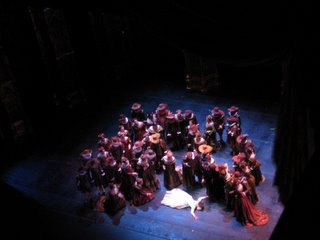Exhaustion

BEFORE Elizabeth Futral, there was Ruth Ann Swenson. Three years ago, also around this time of year, I visited the Met a few times for Swenson's Lucia, which, under the baton of Maestro Patrick Summers, was a brooding, Gothic, delicate piece of high bel canto. Swenson then was coming out of a series of failed Gildas in the prior season, marked by forced top notes, weak resonance, widening vibrato: all dire signs of an overripe soprano passing into the twilight of her coloratura career. But then somehow she regroups, and returns triumphant with a gorgeous, masterful Lucia, hypnotic, with mint notes that sparkled like the crystal bursts of the Met chandeliers.
The Edgardo then was the dashing Marcelo Alvarez. The Swenson-Alvarez tandem was soothing, their love was down comforter, their fall into death inevitable and classic. Maestro Summers' work was expansive but elegantly understated: the orchestra was transparent and gracious, and knew its proper place in this Donizetti. Succeeding Lucia evenings seemed like trips to the spa after a long day's work, and those velvet seats took you in softly, soothing bones and muscles. Beauty was the first command, and everyone delivered. Voices were relaxed, exceptionally civilized, symmetric. Therapy in predictability: the soul fed, the universe realigned: Sieglinde reached a peace by each curtain's fall.
Fast-forward this season. We are force-fed the fiery pair of Elizabeth Futral and Giuseppe Filianoti, and a heavy-handed Maestro Edoardo Müller whose orchestra likes to partake in the screaming match transpiring on stage. The air of minor regional opera, uncertain, unpolished, permeated every scene. Each aria is a tour of subterranean emotions, and the pain rises from each unsettled phrase: by the end of the Mad Scene, I fall to the ground, and during Edgardo's suicide, I feel the dagger slice through my skin. I don't think Donizetti meant to write the first verismo opera, but no matter: Futral treats the high notes not as sweet academic flourishes but as sonic symbols of an unreachable happiness, and every time she launches something up there (in distressing screams) I'm pushed closer to a hard precipice. Though Filianoti moves about the stage gracefully, silent-film style, his grave, desperate heart is too easy to discern amidst the stylish poses of his voice. His phrasing is formidable in beauty and lightness, but it's much more than beautiful: long lines taken in one breath (when it's perfectly fine to break), top notes soaked in grief (throbbing), all compose a sense of vulnerability. Because these emotions appear more spontaneous than designed (young Filianoti perhaps buoyed by this city's extraordinarily warm reception), the evening unsettles right from the fountain scene, and through to the last bars of Edgardo's dying music the internal chaos deepens.
In truth, Futral does not have (or no longer has) a particularly attractive sound. It is now a tattered (yet still bejeweled) bag of tricks: a conclave of ringing top notes desperately wanting to cross into Wagner, curious colors in the middle range, seemingly inexhaustible shower of raw sound (and an ad hoc chest); and that face! Futral's face forces the capital Q in opera Queen. She scowls and she clutches her gown a la Glenn Close in Dangerous Liaisons and runs around the bare stage like a vampire in heat. Every time she opens her mouth, she declares war. (War against sensibility, physics, Donizetti, the Enrico, high D-flat, Swenson, obscenity laws, the pit ...) She collapses, the tornado ends, and as the curtain falls, Sieglinde is challenged to explain where the bel canto hid all evening. But somehow it's all OK. Taking in three of these Lucias is closer in impact to three Mattila Salomes than to, say, three Fleming Rodelindas. Exhaustion has set in; thankfully, I don't have to deal with it again till late December; and much like puking your guts out can never be an effective deterrent to binge drinking, this three-evening Lucia assault will not keep me away from going back and paying good money for this kind of sweet obscenity. OUR SISTER Vilaine Fille believes that the Anglophone blogosphere is full of people who don't know how to listen (in an added comment she wrote in her stupendously praised post on Giuseppe Filianoti, written in Italian so Anglophones like me can't detect their little chatter dagger), referring to Sieglinde's 'alleged' comparison between First Archangel Juan Diego Florez and Peasant Filianoti. Sieglinde's post VF was all venom about was a simple text message relay from a hyperventilating friend who was turned into a Filianoti fan overnight. The comparison was simply a reaction to a wild evening; Sieglinde, having not heard Filianoti live then, translated his *humorous* text messages inaccurately. There was no intention on our part to offend the Most Holy Congregation of Florez, and particularly the High Priestess of the Doctrine of the Congregation of Faith (a.k.a. VF), for we worship rabidly in the same temple. Lest we spark a crusade here, Sieglinde will state for the record (seriously now, after having heard Filianoti thrice) that (a) Florez and Filianoti have different vocal constitutions, (b) they both have a place in the wide operatic altar, (c) Florez is an allcaps GOD, (d) she will check with the High Priestess regarding any future comparisons with Florez the Great, and (e) she promises to go to the ear doctor this afternoon. (So when can Sieglinde get her I-Love-Florez-Like-French-Fries membership card back?)
OUR SISTER Vilaine Fille believes that the Anglophone blogosphere is full of people who don't know how to listen (in an added comment she wrote in her stupendously praised post on Giuseppe Filianoti, written in Italian so Anglophones like me can't detect their little chatter dagger), referring to Sieglinde's 'alleged' comparison between First Archangel Juan Diego Florez and Peasant Filianoti. Sieglinde's post VF was all venom about was a simple text message relay from a hyperventilating friend who was turned into a Filianoti fan overnight. The comparison was simply a reaction to a wild evening; Sieglinde, having not heard Filianoti live then, translated his *humorous* text messages inaccurately. There was no intention on our part to offend the Most Holy Congregation of Florez, and particularly the High Priestess of the Doctrine of the Congregation of Faith (a.k.a. VF), for we worship rabidly in the same temple. Lest we spark a crusade here, Sieglinde will state for the record (seriously now, after having heard Filianoti thrice) that (a) Florez and Filianoti have different vocal constitutions, (b) they both have a place in the wide operatic altar, (c) Florez is an allcaps GOD, (d) she will check with the High Priestess regarding any future comparisons with Florez the Great, and (e) she promises to go to the ear doctor this afternoon. (So when can Sieglinde get her I-Love-Florez-Like-French-Fries membership card back?)



